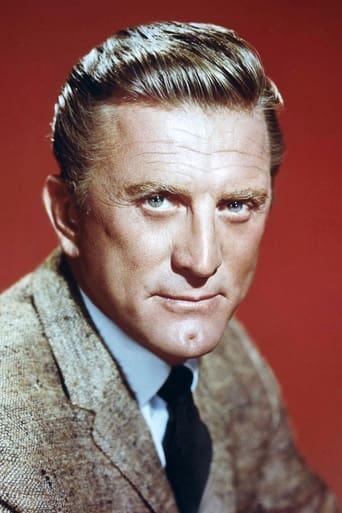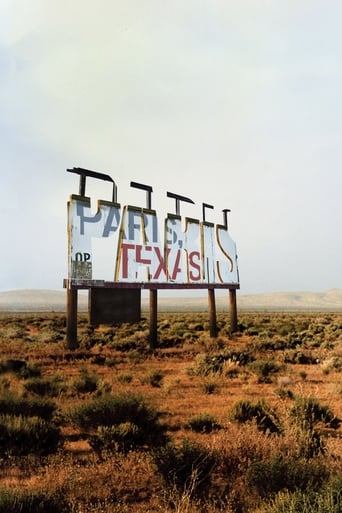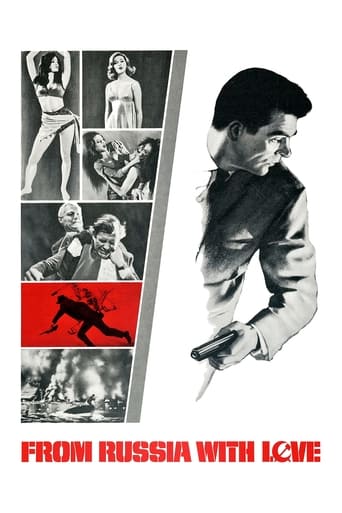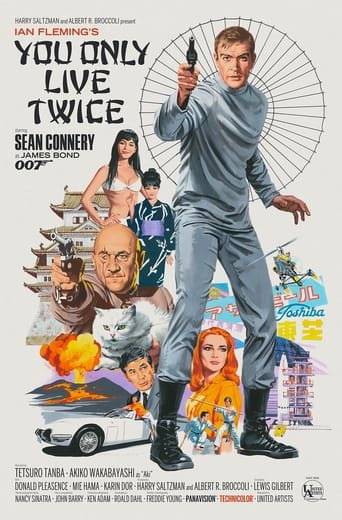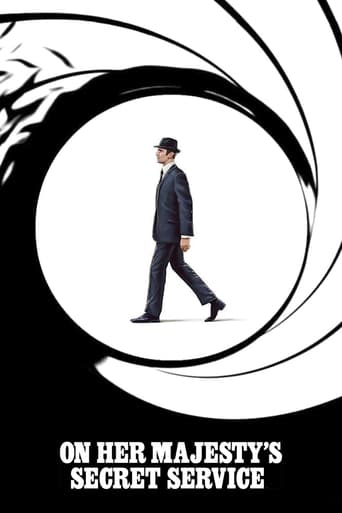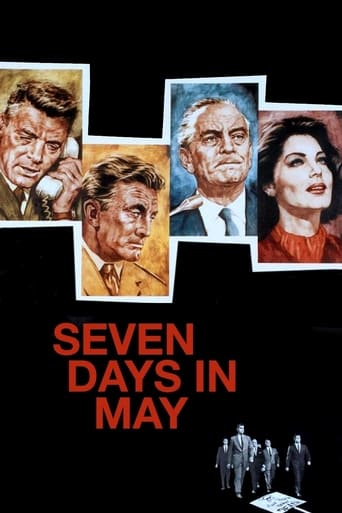
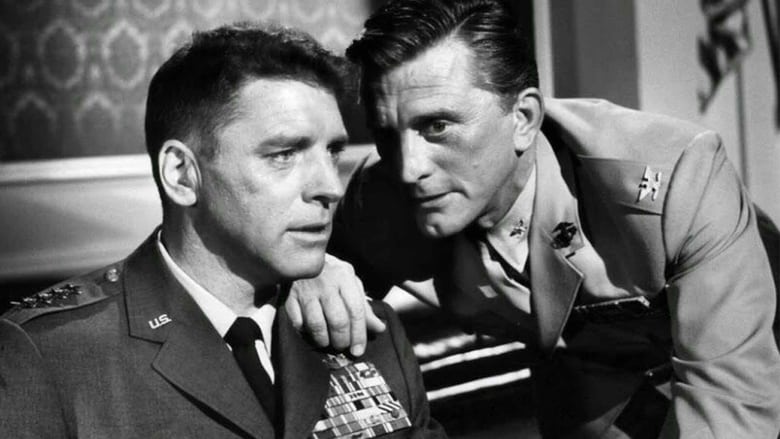
Seven Days in May (1964)
A U.S. Army colonel alerts the president of a planned military coup against him.
Watch Trailer
Cast
Similar titles
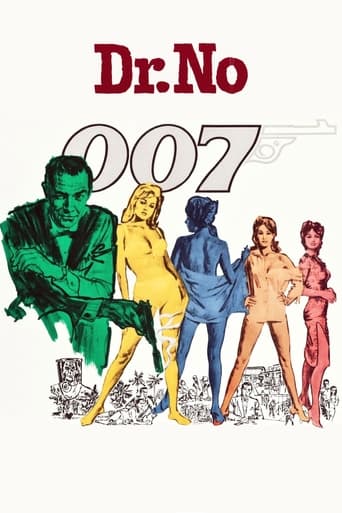
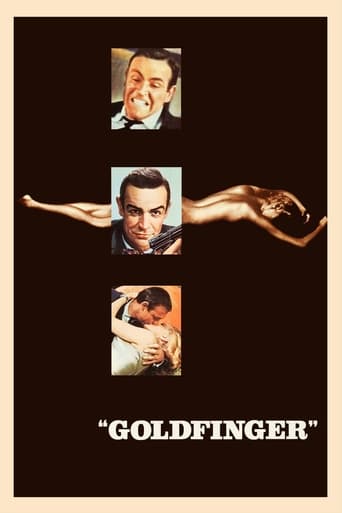

Reviews
To me, this movie is perfection.
Save your money for something good and enjoyable
Admirable film.
Pretty good movie overall. First half was nothing special but it got better as it went along.
The making of this film enjoyed the special protection of President John Kennedy, who personally allowed filming for it within the White House. Kennedy evidently feared a coup attempt of some kind by 'the Deep State' or 'the Military Industrial Complex' (Eisenhower's phrase) and wished the public to be warned about such things. However, he did not live long enough to see this film, since 'they' got him before it was released. It was filmed during 1963 and bears that copyright date on the print, but the release was in 1964, after Kennedy's assassination. His fears were all too justified, though in a rather different form. The film portrays an attempt to stage a military coup in America, which would appoint the Chairman of the Joint Chiefs of Staff, an air force general played with relentless and laser-like intensity by Burt Lancaster, as a new leader for the country. The film bears an uncanny resemblance in many ways to what is happening now, in 2017. Of course, the film got it wrong. The threat was never from the military, but rather from the security agencies. Soldiers do what they are told, security agencies do not tell what they do. They can 'classify' anything, since they hold sole power of 'classification'. Hence they can never be properly scrutinised, and true accountability becomes impossible. They can 'classify' their way out of anything. All they have to do is mention the words 'national security' in a low voice, and everyone trembles and bows down, not least the congressional intelligence committees, whose scrutiny is effectively meaningless. Here we find a liberal President, played to perfection by the dignified and noble Frederick March, whose public approval rating has fallen to 29%, who is hated by the extreme conservative factions, portrayed by a ranting senator and all the chiefs of staff. The names 'Democrat' and 'Republican' are never mentioned in the film. Lancaster's aide is a colonel, played with upright dignity by Kirk Douglas. He has been excluded from the coup plot because he is too 'straight' and actually likes the Constitution. When he begins to realize what is going on, he goes to the President and warns him. That is seven days before the scheduled coup, hence the title of the film. The main themes that are reminiscent of today are that the President is 'too friendly with Russia' and hence 'must be impeached'. The film shows impeachment protest marches and hysteria about being a Russia-lover. This is exactly what is going on at the moment in the real world, and it is 54 years later. The irony is that in the film the President is a liberal, whereas today the situation is opposite in that sense. But the same claims are made, the same hysteria aroused, and the same demands of impeachment resound throughout the land. But instead of the military wanting to stage a coup with soldiers, the soft coup attempt which is currently in progress requires no guns, only highly selective leaks and 'unmasking'. And it is not the Pentagon which is behind it, but the 'Deep State', a phrase nowadays used to describe the unaccountable security agencies and their even more unaccountable sub-contractors. The story is a real thriller, because things get worse and worse and it seems impossible to stop Burt Lancaster. He has created a secret base known as 'Site Y' 50 miles north of El Paso which has a secret army ready to seize the key locations for a military coup on the following Sunday. The President's best friend, a senator played by Edmond O'Brien, is held captive there when he tries to investigate. His other best friend and aide, played by Martin Balsam, is murdered in a plane crash. How can this coup be stopped? Rod Serling has a written taut thriller script which has us guessing right up until the end. It is based on a novel by Fletcher Knebel and Charles W. Bailey II. John Frankenheimer has done his usual excellent job of directing this menacing film, which is in black and white by the way. Ava Gardner is her usual siren self as the lover of Lancaster, but who also makes bedroom eyes at Kirk Douglas. The intrigues are complex and suspenseful. This is an edge of the seat film, and that seat has still not been vacated. Russia-mania is still in full flow 28 years after the Iron Curtain came down. Some security agencies just cannot do without enemies, lest they all lose their jobs and the opportunities to pillage public funds through their unaccountable black budgets. Any enemy will do, but Russia is so convenient, as it has the additional advantage of being old and familiar to all. After all, Russia has that one precious asset so necessary also in the film business and in politics: 'name recognition'.
As good as the movie was, there were two significant disconnects in the story for this viewer; both involved Colonel 'Mutt' Henderson (Andrew Duggan). The first was when Henderson made it out of the Econcom desert hideaway with Senator Roy Clark (Edmond O'Brien) in tow. Didn't they make it out of there just a bit too easily? That there was no pursuit by forces on the ground allowing them to get away scot-free, that just didn't ring true for me.The second was that airport lounge scene when Henderson disappeared off screen, having been brought back under control by Major Scott's (Burt Lancaster) saboteurs. How is it that Senator Clark was left alone, virtually in the same location? They must have known he was there and in on the conspiracy in progress. All the more incredible given that Paul Girard (Martin Balsam) had already been murdered by sabotaging a plane load of civilians and covering it up as a crash.But with those couple of question marks hanging out there, the rest of the story was a pretty good one. Maybe not as tension filled as the same year's "Fail-Safe" about an accidental attack on the Soviet Union with no hope of recall, but it had it's moments of suspense and intrigue. Rod Serling's screenplay brought the drama on screen invariably close to a real life Twilight Zone that the American public never got to witness - the takeover of the United States government by a military coup led by the Chairman of the Joint Chiefs of Staff.For me, the best scene was the confrontation between President Lyman (Frederic March) and Lancaster's Major Scott. The dialog between the two men is masterfully written, culminating in that chilling stare down between Scott and Colonel Jiggs Casey (Kirk Douglas) right after Scott leaves the President's office.Which leads to one last remaining question mark about the picture, that was also a hallmark of many of Serling's Twilight Zone scripts. With the crisis for the President over and the three Joint Chiefs generals resigning, what exactly are the repercussions for Major Scott? Presumably the story continues with penalties involved for the perpetrators of the conspiracy, but we never get to know what they are.
Powerful Cold War drama.It is the height of the Cold War and the US President, Jordan Lyman (played by Fredric March) has negotiated a nuclear arms limitation treaty with the Russians. The military and some politicians are not happy with this, figuring the Russians will renege on the deal, leaving the US vulnerable. Foremost among the opponents of the treaty is General James Scott (played by Burt Lancaster), Chairman of the Joint Chiefs of Staff. On his staff is a Marine Colonel, "Jiggs" Casey (played by Kirk Douglas), who starts to suspect that the General may be planning a coup...Intriguing, entertaining drama. Mostly plausible, though there is some looseness in the plot. In addition, it demonstrates well the link between politics and the military, and who, in a democratic society, takes orders from whom.Solid performances all round. Edmond O'Brien was nominated for a Best Supporting Actor Oscar for playing the drunken-but-resourceful Senator Clark.
The American President Lyman (Fredric March) with low approval ratings has passed a divisive nuclear disarmament treaty. The head of the Joint Chiefs General Scott (Burt Lancaster) opposed the treaty and is organising a secret coup with some of his supporters. His aide Colonel Jiggs Casey (Kirk Douglas) informs the President of the behind the scenes manoeuvring and Lyman instructs some of his trusted men to get evidence of the conspirators plans.Director John Frankenheimer loved a conspiracy thriller. Here he paints the conspirators as misguided and maybe the President as too honourable and principled.The film contains too much talking heads at times and it suffers from it during the showdown between Lancaster and March. The President actually does come across as weak and maybe proves Lancaster's point when in reality a more forceful resolution was required by the Lyman.The film is still masterful, full of intrigue and tension but it does move slowly at the beginning and has a major flaw. If the President was unpopular how did he manage to get the Treaty ratified by Congress? As the treaty is approved by Congress then it make General Scott's action more murkier and he should had been called out more strongly for his treachery.

